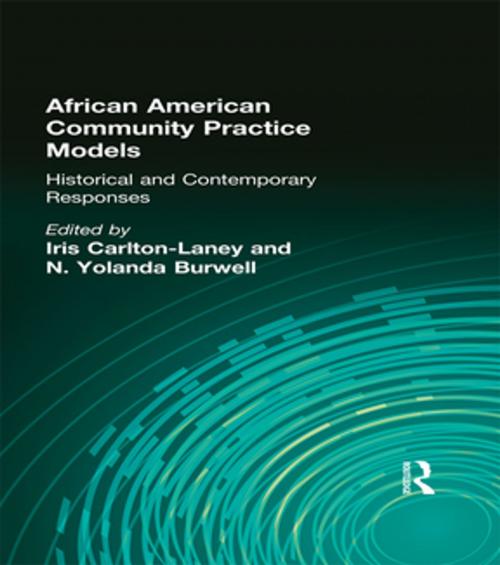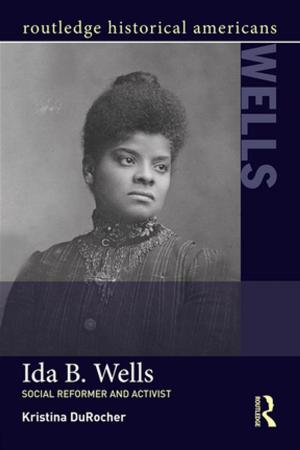African American Community Practice Models
Historical and Contemporary Responses
Nonfiction, Social & Cultural Studies, Social Science, Cultural Studies, Ethnic Studies, African-American Studies, Sociology| Author: | Iris Carlton-Laney, N Yolanda Burwell | ISBN: | 9781317740025 |
| Publisher: | Taylor and Francis | Publication: | March 18, 2014 |
| Imprint: | Routledge | Language: | English |
| Author: | Iris Carlton-Laney, N Yolanda Burwell |
| ISBN: | 9781317740025 |
| Publisher: | Taylor and Francis |
| Publication: | March 18, 2014 |
| Imprint: | Routledge |
| Language: | English |
African American Community Practice Models shows you what you can “see” and “learn” when people of African American descent are put in the center of community analysis and change. This text celebrates African American experiences and challenges you to understand the black experience from the inside out rather than from the outside in. The contributors provide excellent historical and current case studies of leaders and programs that provide you with models for program and community development in African American communities today. For the contemporary social worker, these historical comparisons reveal what strategies have been needed in African American communities in the past because of political and social climates. The studies of current successful programs instruct those in community-based African American programs, general service networks, and students on how to continue to better serve the black community.
The contributing authors use a new lens for understanding social welfare history and social service development. They encourage social workers to explore new model-building and to pursue new knowledge about African Americans in the social work classroom. In addition to tracing the history of community development, African American Community Practice Models specifically:
-
presents the black community from a position of strength and leadership
-
documents leadership in the black community to ground national advocacy organizations
-
traces women’s leadership in community development
-
documents the unrecognized history of African Americans in the development of the Settlement Movement
-
highlights examples of current self-help programs sponsored by African American communities to change negative behavior patterns
-
documents the impact of racism on service delivery and the response to develop community support programs
-
presents a challenge to expand community development for both internal and external advocacy
Professors of the core courses in social work--HBSE, research, policy, and practice--and of specialized courses in community practice, macropractice, and African Americans would benefit from teaching from African American Community Practice Models. Students and faculty in these and other study areas concerned with this community will get community tactics and program development ideas from this book that connect with African American people. The importance of community development from within the African American community, historical and current methods of dealing with the ongoing impact of racism and economic disadvantage, the responsibility of professionals and community leaders to build empowerment strategies within African American communities, and the need to advocate for rights and opportunities in larger society for black Americans are key issues addressed throughout the book, which begins to fill the void of positive presentations of black community development.
African American Community Practice Models shows you what you can “see” and “learn” when people of African American descent are put in the center of community analysis and change. This text celebrates African American experiences and challenges you to understand the black experience from the inside out rather than from the outside in. The contributors provide excellent historical and current case studies of leaders and programs that provide you with models for program and community development in African American communities today. For the contemporary social worker, these historical comparisons reveal what strategies have been needed in African American communities in the past because of political and social climates. The studies of current successful programs instruct those in community-based African American programs, general service networks, and students on how to continue to better serve the black community.
The contributing authors use a new lens for understanding social welfare history and social service development. They encourage social workers to explore new model-building and to pursue new knowledge about African Americans in the social work classroom. In addition to tracing the history of community development, African American Community Practice Models specifically:
-
presents the black community from a position of strength and leadership
-
documents leadership in the black community to ground national advocacy organizations
-
traces women’s leadership in community development
-
documents the unrecognized history of African Americans in the development of the Settlement Movement
-
highlights examples of current self-help programs sponsored by African American communities to change negative behavior patterns
-
documents the impact of racism on service delivery and the response to develop community support programs
-
presents a challenge to expand community development for both internal and external advocacy
Professors of the core courses in social work--HBSE, research, policy, and practice--and of specialized courses in community practice, macropractice, and African Americans would benefit from teaching from African American Community Practice Models. Students and faculty in these and other study areas concerned with this community will get community tactics and program development ideas from this book that connect with African American people. The importance of community development from within the African American community, historical and current methods of dealing with the ongoing impact of racism and economic disadvantage, the responsibility of professionals and community leaders to build empowerment strategies within African American communities, and the need to advocate for rights and opportunities in larger society for black Americans are key issues addressed throughout the book, which begins to fill the void of positive presentations of black community development.















